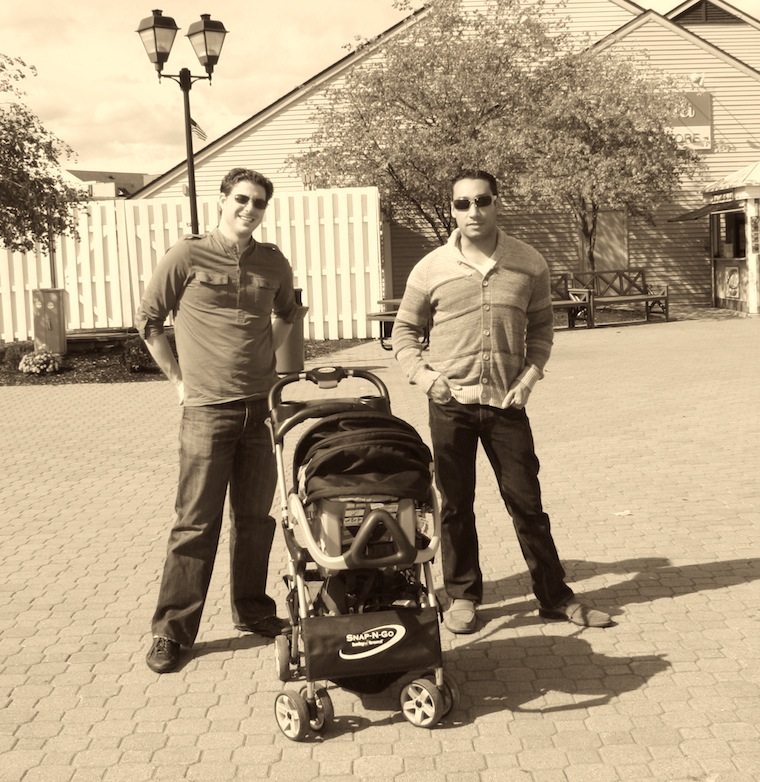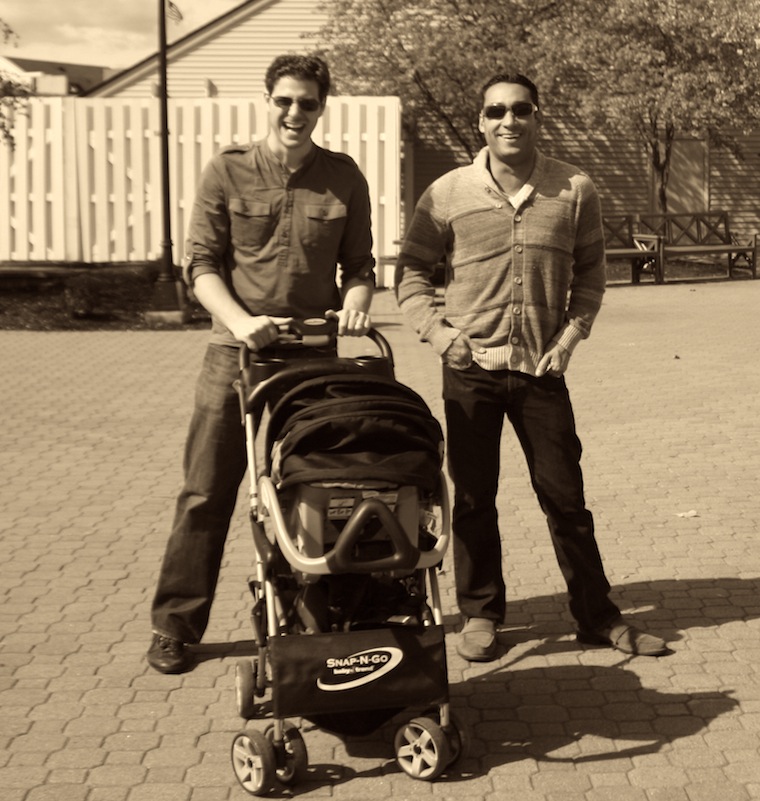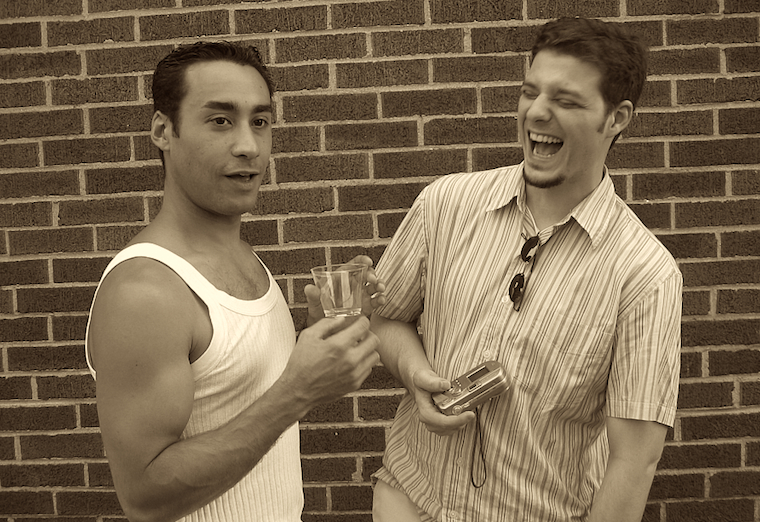{Had history and biology played out differently, I might be in Dr. Joseph Abramo’s position right now. He’s married to my first girlfriend. Yeah, that could have been me. For his wife’s sake, and his I guess, it’s better that it never worked out. Joe has become one of my rare, and therefore treasured, straight guy friends. I still remember the first night I met him: I welcomed him to my attic with typical theatricality, and I’m not sure he knew what to make of it all. Through the years though, he’s become a friend in his own right, and he’s one of the few people who can appreciate Mahler as much as Madonna. (Don’t even get him started on a treatise of ‘Toxic’ by Britney Spears because he can go deep.) He’s also one of the only people on earth to get me to sing along with him (I croaked out a few bars of ‘Like A Prayer‘ as he strummed the guitar.) We also worked on some artistic creation as well, in the form of a few Halloween songs that were more of an excuse to hang out with people I love than any real hope at Billboard glory. When I first contemplated the notion of a Guest Blog, his was one of the first names that came to mind because I knew it would be interesting, intellectual, and just a little bad-ass. It does not disappoint.}
The Crux of Academia & Pop Culture
By Dr. Joseph Abramo
It is a pleasure to write a guest blog for Alan’s website. I’ve been an admirer of his musings, photography, and writings ever since my wife and his childhood friend, Melissa, introduced us. One of our first in-depth conversations was about Madonna. This makes sense because, for a day job, I am a professor, where I teach courses in music and education. I work with twenty-somethings who want to be music teachers.
The professorship is not as glamorous as one might think. We are not the bespectacled, elbow-patch-wearing ilk the general population imagines us to be. In fact, we usually dress more informally than other professions, something I’m sure Alan would be horrified by.
As part of that informality many of us often study topics that some people may be surprised by. One of my topics of study, for example, is how music teachers can incorporate popular music into the classroom. If you were one of the many adults who think back to music lessons as the banging out of awful classical music on the piano, or inducing headaches by blowing air into the oboe, as Alan did, then you can imagine the need for music teachers to have the discussion about using music that is a little more relevant to students. The truth is that the classical music that I and most music teachers love is simply not interesting to most people.
But popular music is incredibly interesting to many people, and for good reason. It allows us to escape repeatedly into our own worlds. My mother tells me that when she was a teenager, she listened to her recording of Simon and Garfunkel’s ‘Sound of Silence’ so many times that the record turned grey because she wore the grooves out. For me it was hearing ‘Smells Like Teen Spirit’ by Nirvana, and buying an electric guitar to learn how to play the song. The repetition irritated her, but she endured it thinking back to her similar relationship with Simon and Garfunkel. For Alan, it is his indefatigable love for Madonna, which he chronicles on this blog.
But our love for popular music is not just frivolous indulgence. It is not simply, as Dick Clark blandly said, “the soundtrack to our lives.” It tells us something about ourselves and about the important issues of the day. Beyonce’s sudden use of feminism, for example, tells us about contemporary womanhood. In many ways it has shown how feminism, once reviled as radical, has become as bland as singing about wanting to “rock and roll all night and party everyday.” This is both a blessing and a curse for feminists. It shows the inroads feminists have made in helping everyone understand issues of equality. But this mainstreaming of feminism might also water down and misrepresent its message. Some, for example, interpret Beyonce dancing on a stripper pole in front of the giant word feminism as a misunderstanding and dismantling of feminism through this popularization. Others see it as an important demonstration of contemporary feminism – that “women can have it all.” Which is it? Probably both and neither; it is a double-edged sword.
Reactions to popular music also tell us about society, too. Former Arkansas Governor and Fox News Channel host, and presumed 2016 presidential candidate Mike Huckabee’s critique of Beyonce as imposing liberal urbanites (read as ‘Black’) values upon the humble conservative middle Americans (read as ‘White’) demonstrates that not everyone embraces equality.
Similarly, recording artist Hozier’s video ‘Take Me to Church’ suggests progress for Gay rights and marriage equality. The song’s lyrics are about heterosexual love; a man sings about a lover, using the pronoun ‘she.’ But the video depicts images of queer love. This mixing of queer and hetero love blurs them, erodes the indefensible distinction that society has made between them and puts them on an equal plane. The fact that such a video was inconceivable twenty years, but passed with little comment today, shows real progress in gay rights and marriage equality. But predictably, like Huckabee’s reaction to Beyonce, some decry the mainstreaming of queer culture as an indication of the decay of ‘good ol’ American values,’ and perform rational, ethical, and legal gymnastics to fight equality and restrict freedoms.
It is because of this “academic” aspect of popular music, along with its ability for us to escape into ourselves that I love popular music, and why I think it has educational value. The cultural theorist Stuart Hall said that he studied popular culture because it is “one of those sites where this struggle for and against culture of the powerful is engaged: it is also the stake to be won or lost in that struggle. That’s why popular culture matters.” Popular music serves as a mirror to ourselves, it tells us about our desires and pleasures. It is a barometer: the ways people react to popular music gives us a reading of where society currently sits on important issues. Use any other metaphor you want to describe its ability to clearly reveal to us the state of society. For Hall, this is the power of popular culture. “Otherwise, to tell you the truth,” he continues, “I don’t give a damn about it.”
So next time you listen to your favorite artist, take some time to ask, “What does this say about society?” Does it articulate my values? Are those who are quick to devalue the music I love creating a veiled critique of me and my values? Or maybe you don’t ask these questions; maybe you just listen and escape into yourself. Either way, to tell you the truth, I don’t give a damn.
Back to Blog


